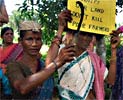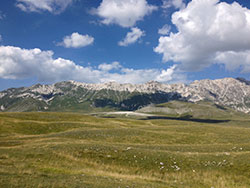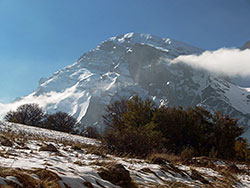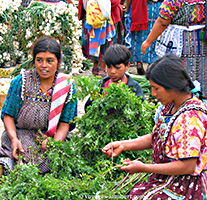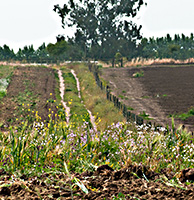A village in Abruzzo, Southern Italy – 1935
Sciatàp
For almost four years Francesco Zompa had lived and worked in New York. He slept on a piece of cardboard under the stairs in the house of hiss boss Carlo Campanella, who came from the south of Italy just like him.
Campanella sold ice cream in the summer and coal in the winter. He had Anglicized his name, and so his shop was named 'Charles Littlebell, Ice &
Coal'. Francesco had toiled from early morning till late in the evening. When he asked his boss anything, he always shouted, “Shut up!”
When Francesco returned to his village, Pietrasecca, at the least little thing he shouted, “Sciatàp” (Shut up) to his wife and children. Therefore this soon became his nickname in the village. After a few years his original name was forgotten about.
In the meantime Mussolini had come to power. Every week a wall poster, 'Le Notizie di Roma', arrived in the village, which the school-teacher had to glue on the church door. She also went with the fresh poster to the locando, the village pub, to read out the main article, and to explain what was meant. The peasants, tipsy from the wine, raised awkward questions. When it was written that “foreign countries would like to pay a lot to have such a splendid leader as their own Duce”, then Sciatàp asked for example: “How much do they want to pay?”, “How much is bid?” and “Who bids more?” When the teacher then explained that this was “so to speak”, Sciatàp reacted with a scornful: “So, it is not true.”
When the poster spoke of a “revolution of agrarians” another peasant asked, “What are these 'agrarians’?”, then the teacher clarified patiently, “That is you, cafoni (farm labourers)”. Immediately several peasants shouted rowdily, “We didn't notice anything of that 'revolution' here”, and, “We only get less for our grain and wine.”
When the teacher, a bit disheartened, advised the peasants “to think it over again” so that next week “they would understand it better”, it went down the wrong way with Sciatàp: “Stop that stupid talk, I have been in America.”
_______________________
Source
The book Bread and Wine (1937), by the Italian writer Ignazio Silone, is about a young man from the city who in a hamlet tries to urge the peasants to resist the fascist regime. Silone himself grew up in a small peasant village.
Go to:
= the next page:
Driven away by the bulldozers - Oklahoma, United States – around 1935 (1), story 90.
= the Table of contents, story 89.
